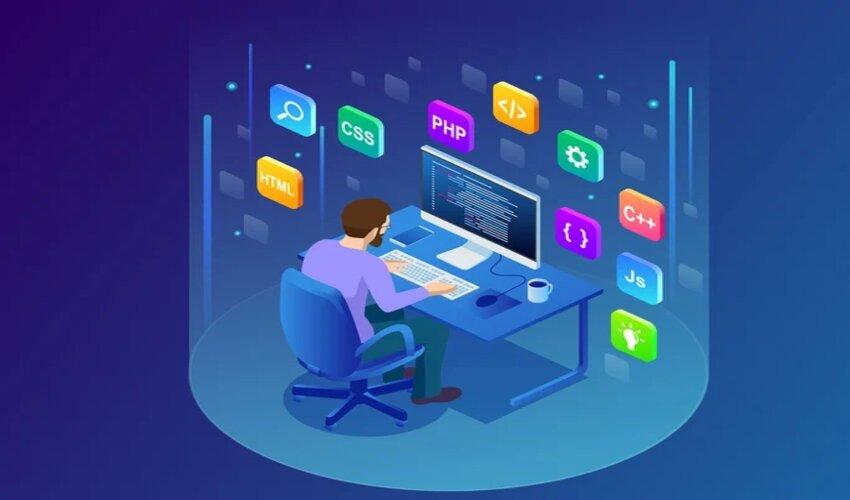
Website development is an all-rounder term that describes all the work of creating and building a website. It includes everything from web programming, publishing, database management, markup, network configuration, and coding to scripting and CMS development. Currently, the internet has become a leading method of research, education, connection, and entertainment around the globe. Unsurprisingly, the web development industry is growing at an increasing rate of 13%.
In this beginner’s guide to web development, we will delve into each type of web development that helps you grasp its functionalities.
What is Web Development?
Web development includes the building and maintenance of websites. The purpose of a web developer is to build a complete, functional website that provides an amazing user experience. Usually, the website must be user-friendly, easy to see, secure, and mobile-friendly. Atlanta web development company uses various programming languages, including JavaScript and Python, to build a website. However, web development varied from building pages from templates to developing a website from scratch.
Types of Web Development
Web development is a dynamic sector that includes various technologies, frameworks, and tools that help build, maintain, and improve websites and applications. Organizations will continue depending on their operations, and understanding different types of web development is crucial for understanding successful projects.
1. Front Web Development
Front-end development refers to the art and scientific process of developing the user-facing portion of a website or app. It is what gives the software its look and feel. If you employ front-end developers, they must be capable of using a wide range of front-end web development technologies and tools to create a site’s style, layout, and interactive features. They must create a seamless experience for the user and ensure that it is easy to navigate and use on different devices and screens.
The front-end development requires technical expertise, an eye for detail, and a design sense. You will need to take a design and transform it into an interactive, functional application that meets your users’ needs.
2. Backend Web Development
Backend web design is one of the best types of website development. Back-end web development is concerned with the server side of online applications. This includes responding to server requests and putting in place application logic. The server-side component is created by back-end developers and web developers using Python, Ruby, PHP, Node.js, or Java.
They also store and retrieve information using MySQL, PostgreSQL, or MongoDB databases. The effectiveness and security of a web application depend on the backend.
3. Full Stack Development
In recent years, full-stack web development has gained a lot more attention. It is a field that focuses on creating dynamic and robust web applications that run well both on the client and server side.
Full stack refers to all the layers of a web app, such as the front and back. It also includes the database layer. Full-stack web developers are responsible for all three layers. They must have a solid understanding of various programming languages, frameworks, and tools to create a web application.
4. Responsive Web Development
In today’s time, Responsive web creation is one of the popular types of web development. So, offering a smooth user experience, responsive website optimization, and adjusting its structure and design for use on multiple devices and screen sizes is crucial. Thus, front-end developers use CSS media queries and flexible grid systems to achieve responsiveness and offer a user-friendly experience across all devices, tablets, and smartphones.
5. Progressive Web Apps (PWA)
PWAs provide users with a web browser experience comparable to native mobile applications by interesting best components of online and mobile apps. It is dependable, interesting, and quick, even on a subpar network. PWAs are deployed on users’ smartphones, enabling offline access and push alerts. To achieve this functionality, they use contemporary web technologies like Service workers, which makes it one of the best types of web development.
6. E-Commerce Development
Creating online shops and a marketplace enables businesses to provide goods and services online. This process is called “e-commerce web development,” and it is one of the best types of web development. The required tools are available via e-commerce systems like Shopify, WooCommerce, and Magento for setting up and operating online stores. In this web development type area, security, payment integration, and positive user experience are significant factors.
7. Content Management Systems (CMS)
CMS portal allows website owners to develop, manage, and change content without detailed technical knowledge. A few of the popular options are Joomla, Drupal, and WordPress. CMS-based web development is one of the popular types of web development suitable for news portal, blogs, and website that needs frequent content changes.
8. Single Page Applications (SPA)
Web apps are SPAs that load just a single HTML page and dynamically alter the content in response to user input. This strategy will minimize the necessity for page reloads by giving users a fluid user experience. Front-end frameworks like Angular, Vuejs, and React are used to build SPAs with APIs to grab data without refreshing the page. It is crucial to consider this as it is one of the best types of web development.
Conclusion
Understanding different types of web development is vital for your next project’s success. Whether front, back end, or full stack development, each will be crucial in building a functional and user-friendly website. Consider the project needs and goals to select the right approach, which ensures a smooth online experience for your user. If you are interested in web development, consult with Appzoro Technologies; they are always ready to help and assist.
Author Bio:
Mr. Sam Agarwal is the Co-founder and CEO of AppZoro Technologies Inc. AppZoro is the leading company for web and app developers in Atlanta.
I help business owners develop sound digital strategies that leverage both current and emerging technologies to increase revenues, streamline productivity, attract investors, and nurture customer relationships.
In this role, I learned the key elements to build a successful startup.
